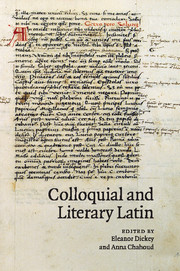Book contents
- Frontmatter
- Contents
- List of contributors
- Acknowledgements
- Foreword (David Langslow)
- PART I THEORETICAL FRAMEWORK
- 1 Introduction
- 2 Colloquial language in linguistic studies
- 3 Roman authors on colloquial language
- 4 Idiom(s) and literariness in classical literary criticism
- 5 Preliminary conclusions
- PART II EARLY LATIN
- PART III CLASSICAL LATIN
- PART IV EARLY PRINCIPATE
- PART V LATE LATIN
- Abbreviations
- References
- Subject index
- Index verborum
- Index locorum
- References
3 - Roman authors on colloquial language
Published online by Cambridge University Press: 04 April 2011
- Frontmatter
- Contents
- List of contributors
- Acknowledgements
- Foreword (David Langslow)
- PART I THEORETICAL FRAMEWORK
- 1 Introduction
- 2 Colloquial language in linguistic studies
- 3 Roman authors on colloquial language
- 4 Idiom(s) and literariness in classical literary criticism
- 5 Preliminary conclusions
- PART II EARLY LATIN
- PART III CLASSICAL LATIN
- PART IV EARLY PRINCIPATE
- PART V LATE LATIN
- Abbreviations
- References
- Subject index
- Index verborum
- Index locorum
- References
Summary
INTRODUCTION
Linguistic register has been characterised as the result of a speaker's choice in a given situation (see Müller 2001: 282–3). It is, nevertheless, impossible to draw a hard-and-fast dividing line between linguistic variables always used by certain speakers and those about which a speaker might choose (so Müller 2001: 283; cf. Coseriu 1980: 111–12). Moreover, speakers and writers do not choose between a finite number of discrete linguistic varieties but modify their language in a continuous way according to the situation. The question what register is, and how it is divided from sociolect, is discussed in Chapter 2. Here we address a simpler question: how did Roman authors conceive of Latin as including options between which speakers and writers had to choose? This question encompasses several more specific ones. What awareness do authors show of a gap between formal and less formal varieties of their language – for example written and oral or official and familiar? What, if any, legitimacy or correctness did they assign to the different varieties, especially the informal ones? What do we learn from the metalanguage of scholars describing linguistic varieties?
We thus leave aside in the first instance passages in which Romans divide Latin into different varieties used by different groups of speakers, since such distinctions reveal concepts of geographical or social variation rather than of register.
- Type
- Chapter
- Information
- Colloquial and Literary Latin , pp. 12 - 41Publisher: Cambridge University PressPrint publication year: 2010
References
- 3
- Cited by



